
Carole Lombard was an American actress. In 1999, the American Film Institute ranked Lombard 23rd on its list of the greatest female stars of Classic Hollywood Cinema.

Alice Brady was an American actress of stage and film. She began her career in the theatre in 1911, and her first important success came on Broadway in 1912 when she created the role of Meg March in the original production of Marian de Forest's Little Women. As a screen actress she first appeared in silent films and was one of the few actresses to survive the transition into talkies. She worked until six months before her death from cancer in 1939. Her films include My Man Godfrey (1936), in which she plays the flighty mother of Carole Lombard's character, and In Old Chicago (1937) for which she won the Academy Award for Best Supporting Actress.
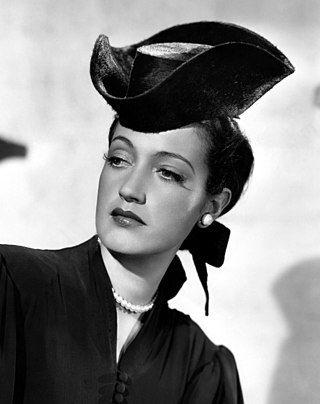
Dorothy Lamour was an American actress and singer. She is best remembered for having appeared in the Road to... movies, a series of successful comedies starring Bing Crosby and Bob Hope.

Leo Robin was an American composer, lyricist and songwriter. He is probably best known for collaborating with Ralph Rainger on the 1938 Oscar-winning song "Thanks for the Memory," sung by Bob Hope and Shirley Ross in the film The Big Broadcast of 1938, and with Jule Styne on "Diamonds Are a Girl's Best Friend," a song whose witty, Cole Porter style of lyric came to be identified with its famous interpreter Marilyn Monroe.
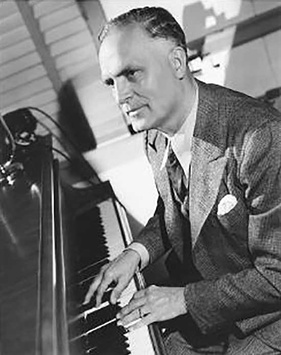
Ralph Rainger was an American composer of popular music principally for films.

Albert Maurice Hackett was an American actor, dramatist and screenwriter most noted for his collaborations with his partner and wife Frances Goodrich.

Frances Goodrich was an American actress, dramatist, and screenwriter, best known for her collaborations with her partner and husband Albert Hackett. She received the Pulitzer Prize for Drama with her husband in 1956 for The Diary of Anne Frank which had premiered the previous year.

The Big Broadcast of 1938 is a Paramount Pictures musical comedy film starring W. C. Fields and featuring Bob Hope. Directed by Mitchell Leisen, the film is the last in a series of Big Broadcast movies that were variety show anthologies. This film featured the debut of Hope's signature song, "Thanks for the Memory" by Ralph Rainger.

The Big Broadcast of 1937 is a 1936 Paramount Pictures production directed by Mitchell Leisen, and is the third in the series of Big Broadcast movies. The musical comedy stars Jack Benny, George Burns, Gracie Allen, Bob Burns, Martha Raye, Shirley Ross, Ray Milland, Benny Fields, Frank Forest and the orchestra of Benny Goodman. It was in this film that Leopold Stokowski made his movie debut conducting two of his Bach transcriptions. Uncredited roles include Jack Mulhall.

Claude Binyon was a screenwriter and director. His genres were comedy, musicals, and romances.

Shirley Ross was an American actress and singer, notable for her duet with Bob Hope, "Thanks for the Memory" from The Big Broadcast of 1938. She appeared in 25 feature films between 1933 and 1945, including singing earlier and wholly different lyrics for the Rodgers and Hart song in Manhattan Melodrama (1934) that later became "Blue Moon."
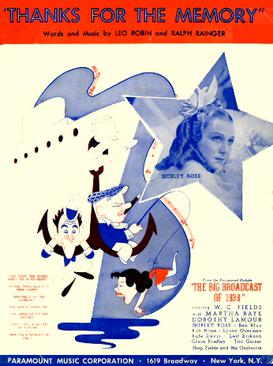
"Thanks for the Memory" (1938) is a popular song composed by Ralph Rainger with lyrics by Leo Robin. It was introduced in the 1938 film The Big Broadcast of 1938 by Bob Hope and Shirley Ross, and recorded by Shep Fields and His Orchestra featuring John Serry Sr. on accordion in the film and vocals by Bob Goday on Bluebird Records. Dorothy Lamour's solo recording of the song was also popular, and has led to many mistakenly believing over the years that it was she who sang the tune with Hope in the film.
"Two Sleepy People" is a song written on September 10, 1938 by Hoagy Carmichael with lyrics by Frank Loesser.
"That Certain Feeling" is a 1925 song composed by George Gershwin, with lyrics by Ira Gershwin.
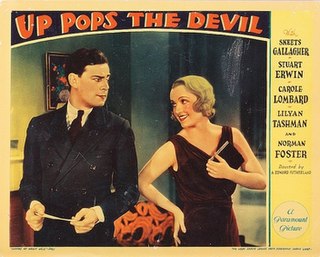
Up Pops the Devil is a 1931 American pre-Code comedy drama film directed by A. Edward Sutherland. The screenplay concerns an advertising man who quits his job to become a novelist, upsetting his wife and straining their marriage. The film was released by Paramount Pictures. The screenplay is based on a 3-act play of the same name written by Albert Hackett and Frances Goodrich; the play ran on Broadway for 148 performances from September 1930 to January 1931 at the Theatre Masque.
Patricia Anne zu Hohenlohe-Waldenburg-Schillingsfürst was an American film actress of the late 1930s.

This is a selection of films and television appearances by British-American comedian and actor Bob Hope (1903-2003). Hope, a former boxer, began his acting career in 1925 in various vaudeville acts and stage performances
Everybody's Welcome is a musical comedy with a book by Lambert Carroll, lyrics by Irving Kahal, and music by Sammy Fain. The musical has two acts and a prologue. Based on Up Pops the Devil by Frances Goodrich and Albert Hackett, the musical's plot centers on an un-married couple, Ann Cathway and Steve Merrick, living in Greenwich Village. The musical is best known for originating the song "As Time Goes By", with music and lyrics by Herman Hupfeld. The song was part of the "additional material" provided for the musical by songwriters other than Kahal and Fain. It is the only music from this work that has not been lost.
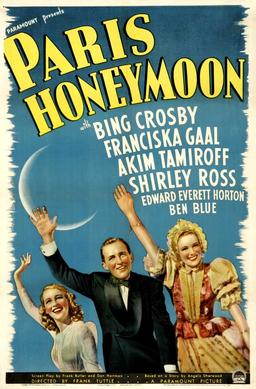
Paris Honeymoon is a 1939 American musical film directed by Frank Tuttle and written by Frank Butler and Don Hartman. The film stars Bing Crosby, Franciska Gaal, Akim Tamiroff, Shirley Ross, Edward Everett Horton and Ben Blue. Filming took place in Hollywood from May 23 to July 1938 and the film was released on January 27, 1939, by Paramount Pictures.

Blossoms on Broadway is a 1937 American comedy film directed by Richard Wallace and starring Edward Arnold, Shirley Ross and John Trent. The film was released on November 19, 1937, by Paramount Pictures.














